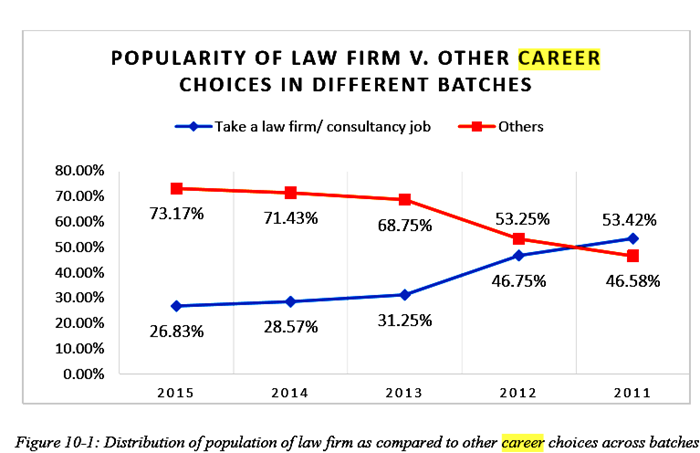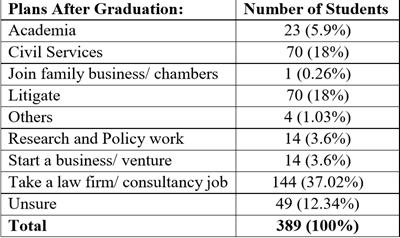
At NLSIU Bangalore, more than one-third of the entire LLB student population wanted to join a law firm or a legal consultancy after graduation, but the career option was less popular with more junior batches.
A diversity study on 389 NLS students (out of total 397 across the five LLB batches between 2011 and 2015) conceptualised by NLSIU student Chirayu Jain, revealed that 37 per cent of the total respondents wished to take a law firm or legal consultancy job after graduation.
The next highest preferred choices were litigation and civil services, at 18 per cent each.
Around 6 per cent wanted to go for academia, while the other largest chunk of 12 per cent were “unsure”.

Batch-wise
The class that graduated in 2015 was the biggest contributor to the popularity of the law firm/legal consultancy option. More than half of that class (53.42 per cent) circled law firms as an option.
But for the class graduating in 2017, when asked in their fourth year, this trend began to reverse – 53.25 per cent of students said they’d prefer non-law firm career plans.
That trend continued the younger the batch: out of those graduating in 2018, only 31 per cent want to join a law firm or consultancy; this drops to 28 per cent for those graduating in 2019, and 27% for the 2020 graduating batch.
It could not be established whether that trend related to law firms becoming less popular as a career choice with more recent batches, or whether law firms simply become more popular in more senior batches as students get seduced by the big pay packages won by co-students.
Smart women and the ‘safest option’
Women from tier 1 and tier 2 cities formed the biggest chunk of law firm/legal consultancy aspirants: 62 per cent of the aspirants were female.
“This can be partly explained by the fact that law firm as a career choice closely tracks the CGPA of the individual, and women on average have higher CGPA than men,” the report notes.
It adds:
“Much has been written about the relatively risk-averse nature of women (whether it is because of biology or socialization), and that could be a factor to consider here as well. Getting placed at a law firm is relatively easy due to the large number of Law Firms recruiting directly from campus. Further, success in a law firm does not require taking risks, and growth within the firm is largely proportionate to the number of years spent working there. When compared to the next two most popular career choices- the civil services and litigation, a Law Firm job is by far the ‘safest’ option. Also important is the professional environment at a Law Firm, which is less likely to be sexist than the Courts.
It’s harder to get a law firm job if you’re not from a big city
There were twice as many law firm and consultancy aspirants born and educated in tier 1 and 2 cities, compared to those from tier 3 and 4 cities.
The report observes: “Apart from CGPA, law firms also tend to consider prior law firm internship experience in their recruitments. Students who live outside cities which have a presence of the popular law firms (Delhi, Mumbai and to a limited extent, Bangalore) have to spend money out of their own pocket to travel to these cities and intern there. The stipend offered by the Law Firms is largely insufficient to cover all costs of travel, accommodation, etc.”
Civil services popular with tier 3 & 4 cities
The tier 3 and 4 city students largely preferred civil services.
“Students born and brought up in smaller towns prefer civil services. Whereas students who have spent all their life in a big city are least likely to opt for civil services. Hence, the assumption students from bigger cities tend to prefer law firms holds true. One reason for this might be that they are used to living the Metropolitan life, hence they are more comfortable living the city life while working in a law firm. Also, civil servants are more visible in smaller towns (as collectors) than they are in Tier 1 or 2 cities,” states the report.
Civil services ‘unsurprisingly’ popular among ST/SC students; Brahmins & co go for law firms
All the scheduled caste students and 80 per cent of the scheduled tribe students chose civil services as their preferred career option.
The report notes: “The preference of Scheduled Caste and Scheduled Tribe groups in specific towards the Civil Services is not surprising, especially because the UPSC exam has allotted quotas for SCs and STs, slightly increasing their probability of clearing the infamously competitive exam. Further, a career in the Civil Services perhaps also offers more social mobility than most other careers.”
Brahmins (42.96 per cent) and other “Upper Castes” (42.6 per cent) largely opted for law firms.
Courts mostly for the boys (and for the smart ones)
Men (22.6 per cent) were almost double in number than the women (11.9 per cent) in choosing litigation as an future option, out of the 18 per cent students who chose this option.
Most students choosing litigation came from the high performers’ group – with a CGPA above 5.5.
“As mentioned earlier, this could be due to various factors such as the barriers women face in the Courtroom due to sexism, and the fact that establishing a career in the field of litigation involves considerable risk,” the report reiterated.
It added that litigation was an unpopular choice due to its low economic profitability in early stages of the career, and that more than 30 per cent of the students from the highest family income group (above Rs 36 lakh annually), who chose litigation, didn’t consider their family income while choosing a career path.
Hat-tip to @jimanish for pointing us to the report on Twitter
Also read:
Full research paper via SSRN: The Elusive Island of Excellence
threads most popular
thread most upvoted
comment newest
first oldest
first
Would be interesting to study that.
To add a little more perspective for the readers and the author, many who quit firms, either join in-house (for the stress free life), or "take the plunge" into litigation (using their savings as a cushion for the initial years). Of course, a few quit law for things more "interesting".
Mostly moderate to extremely privileged. Among alums, Rhodes scholars/Harvard/Yale/Oxford LLMs have chosen litigation too.
I think it's a great piece of research - if no one asks those sometimes uncomfortable questions, how will people have the data to decide that a change is (or is not) needed.
timesofindia.indiatimes.com/city/nagpur/MNLU-facing-funds-crunch-of-Rs50cr-at-start/articleshow/52561359.cms
Wonder how many students/alums of NLSIU think CGPA is even remotely indicative of intellect..
On another note, it would be interesting to see the CGPAs of the few NLSIU alums who have been designated as seniors so far... Not saying being designated a senior makes a person "smart" but still would be interesting..
Obviously intelligence is more nuanced and complicated than a single number, though you'd generally colloquially say that higher GPAs = more academic smartness, no? (there are obviously individual exceptions, like me and you of course :)
Kian you assume too much... How do you know that I don't have a CGPA > 5.5 and am about as smart as dog poo :)
No offence to dog poo !
Of course, some students with lower CGPA get training contracts with Magic Circle firms because they appear "smarter" overall in view of their other awards/achievements, but it is an exception. As we all know, most Indian firms typically don't even consider students with low ranks at fresher level.
After a few years in the profession, CGPA hardly matters. So no use looking at CGPA of partners and senior counsel.
DISCLOSURE: I never had top CGPA (but got a top job). I don't care two hoots about CGPA unless the candidate has other achievements. Just adding perspective to my comment.
1. SC/STs are oppressed.
2. SC/STs tend to take up certain jobs after law school.
3. Do SC/STs tend to take up certain jobs because they are oppressed?
Or;
1. Upper Castes/Brahmins are privileged.
2. Brahmins tend to take up certain jobs after law school.
3. Do Brahmins take up these jobs because they're privileged?
These sorts of questions need hard data to back them. This is hard data.
threads most popular
thread most upvoted
comment newest
first oldest
first